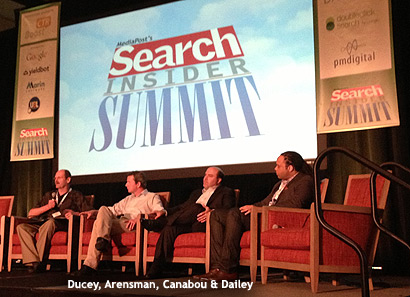
The next phase of search engine marketing integrates information and data from social, along with devices. It means crossing media platforms and using social data
to understand individuals, rather than just seeing updates from friends. But with search changing more rapidly today than in the past 10 years, marketers need to keep an eye on everyday tasks. It will
take experimentation and tracking to take brand campaigns out of the search box.
Marketers can expect continued innovation in search ad formats. Some of the ads will relate directly to search
intent, while others will combine social signals from a variety of sources, such as Foursquare, according to Marc Canabou, vice president of global search business at Yahoo, who spoke at
the MediaPost Search Insider Summit, Amelia Island, Florida, on Monday.
advertisement
advertisement
What about moving from serving ads to real-time bidding for consumers? asked Chris Knoch, vice president of
strategic solutions at IgnitionOne. Consumers compare prices online, but what about having the ability to send a single message to the store "that I'm about to walk out?" he asked.
Joan
Arensman, search advocate at Google, turned the tables a bit to explain a feature in the paid-search platform Enhanced Campaigns. He said the platform offers a feature for local search called layer
proximity bidding. The tool changes the bid price based on the proximity of the consumer to the store. "For anyone within two miles of my store, I want to bid 20% higher; anyone within a mile of my
store, I want to bid 40% higher; and anyone within a half of a mile I want to bid 60% higher," he said.
Search Insider Summit attendees got a rare opportunity to hear insights from Arensman,
Canabou, and Jason Dailey, director of Bing evangelism at Microsoft. The discussion -- led by Rick Ducey, managing director at BIA/Kelsey -- provided insight into search today and in the future,
especially local search on mobile. He expects all national spend in local media to generate about $52 billion by 2017 -- with about one-third of this from national brands.
Canabou highlighted
the significance of pulling in information from offline activities. He said now that the engines have the world's content indexed and crawled, the "uniqueness" in search queries will come from
integrating offline data across devices. By 2015, he projects that one-third of all Americans will own a tablet, along with smartphones and PCs.
The ways in which search marketers will use
social data from platforms like Foursquare continue to emerge. Dailey said most social data lives in silos -- but in the future, the social data in Foursquare will integrate more closely to support
search, including in the automotive industry.
Arensman, Canabou and Dailey stressed the importance of testing and experimentation as search continues to evolve.
"When it comes to
discovery, social signals are much more powerful than traditional search signals. Devices like Google Glass provide more social context and make discovery more relevant and meaningful," said Aaron
Goldman, Kenshoo CMO. "Personally, Google Glass also introduces a new element of social awkwardness."
While software partnerships will become more important for Yahoo, hardware will become
increasingly significant for Google and Microsoft, acting as the hub to connect consumers. Connected gadgets like Xbox 360 and Google Glass will more closely knit social into search. The Karthik's Geek Center points to the recently released Google Glass specs, revealing an
integration of near field technology, a form of automatic identification technology.
The integration of social and search continues to change business models, too. On Monday, the global
performance marketing company Matomy Media Group announced the consolidation of search and social marketing services Mediasheva and the search engine marketing (SEM) services of MediaWhiz under the
global Matomy brand.
MediaWhiz will continue to operate a separate consultative SEO practice for clients. The company moved into search after the 2006 acquisition of Florida-based Global
Resource Systems. Following a series of smaller acquisitions, it developed paid and organic search, online reputation management, social media marketing and coordinated SEO/SEM campaigns.